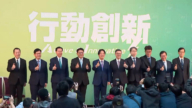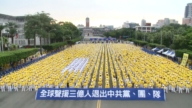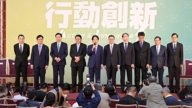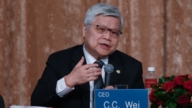【新唐人2011年5月6日讯】《新唐人亚太台》与台湾“中华电信”公司的卫星租约,遭到“中华电信”片面终止续约,事件引发美国国会资深众议员戴纳.罗拉巴克(Dana Rohrabacher)的高度关切。与此同时,《新唐人亚太台》也向台湾的主管机关NCC陈情,希望台湾政府维护中华民国宪法所保障的“言论及新闻自由”。
戴纳.罗拉巴克议员在5月3号“世界媒体自由日”当天,发出一封给中华民国马英九总统的信函,他措辞强硬质问马英九总统这个决定的“背后动机”,他还说出重话,表示,如果台湾不支持或声援中国境内对思想自由的奋战,他认为,美国没有必要支持台湾。
台湾电信业的龙头“中华电信”,旗下的“国际电信分公司”在四月中对《新唐人亚太电视台》表示,今年八月卫星服务合约到期后不再续约,理由是新的卫星“中新二号”频宽不足。
而《新唐人亚太台》发言人朱婉琪律师表示,《新唐人亚太台》租用“中华电信”“中新一号”卫星至今四年多,台湾约有三分之一的有线电视收视户可以收看到《新唐人》节目,因此被中共视为眼中钉。
她质疑,“中华电信”在公开资料上介绍说:“中新二号”卫星比“中新一号”卫星性能优越、涵盖范围更广、发射功率更高,承载的转频器数量及频宽更多。与《新唐人》不再续约的理由明显不符。
台湾讯息流通事业最高主管机构NCC(国家通讯传播委员会),5月3号早上收到《新唐人》的申诉书。NCC营运管理处官员表示,依据电信法相关规定,“中华电信”为市场主导业者,针对客户不得为“差别服务”,也就是不能无故任意挑选客人。
吴政翰 (中华民国“自由通讯传播协会”秘书长):“中华电信对于新唐人可能发生的差别待遇,我们是希望政府也能出面介入,希望中华电信秉持公正客观的态度,对新唐人的续约予以合理的评断”
2008年6月,《新唐人》纽约总台租用的欧洲“欧卫公司”卫星转发器,遭到关闭﹔2009年十一前后,《新唐人亚太台》遭长时间盖台断讯,当时,事件都曾引起许多国际组织的关注。
新唐人亚太电视台 发言人 朱婉琪:“台湾政府,应该要强烈去要求,它所实质控制的中华电信,要符合台湾的民主法治的标准,来对待台湾敢于维护新闻自由、不跟商业利益妥协的新唐人亚太台”
上个月29号,台湾的中华民国总统马英九,接受德国《明镜》周刊访问时,特别说明了为什么要与中共持续发展关系。他说,就是要用台湾的自由、民主、人权和法治来影响中共。
台湾“自由通讯传播协会”理事长吴惠林,也在媒体发表评论文章,他表示,政府保障独立媒体的发声,就是在维护民主社会中宪法所保障的“言论及新闻自由”核心价值。有鉴于此,对于任何企业或个人,以任何方式牺牲或损害独立媒体发声,做出有悖普世价值、民主潮流的作为,政府从宪法保障的角度应该介入,让报导两岸三地真相的媒体继续在民主台湾发声。
新唐人记者李庭、薛莉综合报导。
Blockage of Taiwan’s NTDTV Broadcasts
New Tang Dynasty Asia Pacific Television (NTD AP)
leases a satellite from Taiwan’s Chunghwa Telecom.
Chunghwa’s refusal to renew the contract concerns
senior U.S. Congressman Dana Rohrabacher.
NTD AP has also filed an appeal with Taiwan’s NCC
(National Communications Commission), hoping that
the Taiwanese government will help safeguard citizens’
constitutional rights of speech and press freedom.
On May 3, World Press Freedom Day,
Rohrabacher wrote to Taiwan’s President Ma Ying-jeou,
questioning him about the incident’s “underlying motives."
Rohrabacher warned Ma, saying that if Taiwan doesn’t
support China’s fight for freedom of thought, he believed
that U.S. support for Taiwan will become unnecessary.
Taiwan’s leading telecom company, Chunghwa’s
subsidiary, CHT-International, told NTD AP in mid-April,
that after the satellite contract expired in Aug 2011, it
would not be renewed, due to the “insufficient
capabilities” of the new ST-2 satellite.
NTD AP spokeswoman Attorney Theresa Chu said,
NTD AP has been leasing the ST-1 satellite for over
4 yrs, broadcasting to 1/3 of Taiwan’s cable TV viewers.
As a result, the Chinese authorities (CCP) see
NTD AP as a thorn in their side.
Chu questioned Chunghwa’s claim that its ST-2
satellite is more capable than its predecessor, the ST-1,
having a wider coverage area and more powerful
transmission power. This claim contradicts Chunghwa’s
reasons to refuse to renew its contract with NTD AP.
Taiwan’ National Communications Commission (NCC)
received NTD AP’s appeal on May 3.
NCC Operations officials said that as per the Telecom
Act, Chunghwa, as a leading firm in the telecom industry,
cannot give “preferential treatment" to its clients, meaning,
it cannot arbitrarily select its customers.
Wu Cheng-Han, Secretary-General of Taiwan’s
Free Communication Association:
Satellite services are very important for a TV station.
Without it, audiences would be significantly affected.
I hope Chunghwa will adopt a fair, reasonable, and
objective attitude towards renewing NTD’s contract.
In June 2008, European telecom company Eutelsat,
stopped renting a satellite transponder to NTD.
Shortly before the CCP’s state celebration in Oct 2009,
NTD AP was being blocked for long periods of time.
This attracted the attention of many international orgs.
NTD AP spokeswoman Theresa Chu: We believe that
the Taiwanese government should strongly request
that Chunghwa—which it controls—respect and value
Taiwan’s democracy and rule of law, and make the
right decision to renew the contract.
On April 29, Taiwanese President Ma Ying-jeou,
told German Der Spiegel magazine the reason Taiwan
needs to develop good relations with the CCP. Ma said
he would use Taiwan’s freedom, democracy, human
rights, and the rule of law to influence the CCP.
Free Communication Association’s chair, Wu Huilin,
commented that the Taiwan government’s protection
of the voice of independent media is the protection of
the constitutional values of speech and freedom of press.
If any business/individual prevents independent media
from having a voice, contrary to universal values, the
government should intervene from the perspective
of guarantying constitutional rights, and ensuring that
the media continues to report the truth.
NTD reporters Li Ting and Xue Li



























